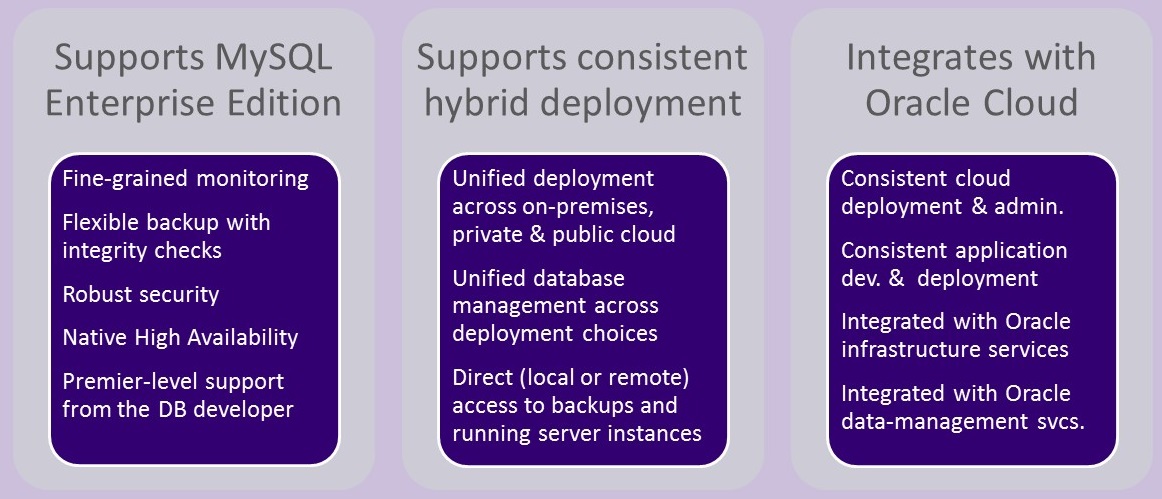Oracle Differentiates its MySQL Cloud Service
MySQL is available as a service on every major public cloud. Here’s how Oracle MySQL Cloud Service is different.
You’ll find MySQL available as a service on every major public cloud (and plenty of minor ones). So what’s different about the Oracle MySQL Cloud Service, introduced on Oracle Cloud last fall by the owner and current developer of MySQL software?
There are three key differences between the Oracle MySQL Cloud Service and other MySQL cloud services, as I’ll explain, but first a bit of background. MySQL is the most popular open-source database management system in the world, so it should be no surprise that it’s also broadly available as a cloud service. MYSQL is one of six database engines available through Amazon Web Services’ Amazon RDS database service. MySQL has been available through Google Cloud SQL since way back in 2011. Microsoft more recently saw the open source light and introduced Azure Database for MySQL and PostgreSQL in May.

Oracle MySQL Cloud Service differentiators fall into three categories.
So just how has Oracle differentiated its own cloud service? My latest report, Enterprise-Class MySQL Meets Oracle Cloud, explores key differences in three areas. For starters, Oracle MySQL Cloud Service is the only service that’s based on MySQL Enterprise Edition. This is the commercial version of the database that adds enterprise-grade features for monitoring, backup, security and support that are not available in MySQL Community Edition. On the security front, for example, Enterprise Audit tracks database access and usage, Enterprise Encryption protects data during transfer and at rest, and Enterprise Firewall guards against real-time attacks including SQL injection.
On support, Oracle MySQL Cloud Service is backed by the same team that developers and supports MySQL itself. Oracle is in a unique position to resolve technical problems tied to the database software, prioritize bug fixes and issue forward-compatible hot fixes in advance of a next MySQL release. What’s more, Oracle MySQL Cloud Service includes premier-level, consultative support with 15-minute initial response for Severity 1 cases in which the service is stopped or severely compromised.
The second key difference with the Oracle MySQL Cloud Service (and with Oracle Cloud) is that it’s built with hybrid deployment scenarios in mind. Oracle has hundreds of thousands of customers that still have on-premises data centers, so it has developed unified administrative tooling that supports public-cloud, private-cloud and on-premises deployments and the shifting of workloads among these environments. Oracle Enterprise Manager, for example, supports “single-pane-of-glass” management across data centers, private clouds and Oracle Cloud with self-service provisioning and policy-based resource management.
Hybrid portability is also available to companies that are interested in running MySQL Community Edition deployments on premises. There’s 100 percent file compatibility between Enterprise Edition and Community Edition, so users of the Oracle MySQL Cloud Service can simply avoid implementing Enterprise-Edition features for applications that might be migrated and run on-premises using Community Edition software.
The third differentiation for the Oracle MySQL Cloud Service is that it offers many points of integration relevant to Oracle Cloud customers. The Oracle Cloud Console, for example, provides a consistent, consolidated administrative interface to all services, including Oracle MySQL Cloud Service. DevOps teams will appreciate that Oracle MySQL Cloud Service is integrated with Oracle PaaS services including Oracle Java Cloud Service and the Oracle Application Container Cloud Service. Together, these services support development of applications in Java SE, Node.js, PHP and Python that can then be deployed in Oracle Cloud or in hybrid scenarios. Finally, Oracle-centric data-management professionals will appreciate integration with Oracle PaaS capabilities including the Oracle GoldenGate Cloud Service and Oracle Data Integrator Cloud Service. Oracle Database customers can use the GoldenGate Cloud Service to offload basic reporting workloads to the less expensive Oracle MySQL Cloud Service. Similarly, simple ETL workloads can be offloaded to the combination of Oracle’s Data Integrator Service and Oracle MySQL Cloud Service.
These are just the highlights from Enterprise-Class MySQL Meets Oracle Cloud. The full, 21-page report dives into the details and includes a competitive analysis and pricing comparisons along with my in-depth take on best-fit use cases. Click here to download a free excerpt of the full report.
Related Reading:
Constellation ShortList™ Hybrid- and Cloud-Friendly RDBMS
SAP Machine Learning Plans: A Deeper Dive From Sapphire Now
Infor Advances Data Agenda With ‘Coleman’ AI, Birst BI Integration

